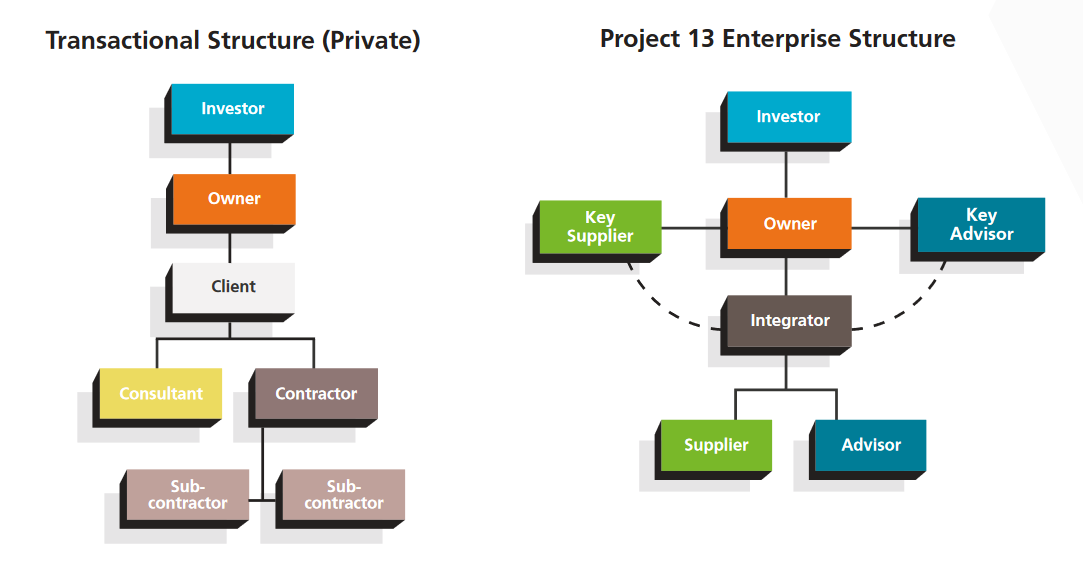Enterprise model for infrastructure
Project 13 is an Institution of Civil Engineers (ICE) - led initiative to boost certainty and productivity in the delivery of infrastructure, to improve whole-life outcomes and to support a more sustainable, innovative, highly-skilled industry. It is a response to a general perception that the infrastructure sector’s current operating model is broken, with projects delivered over budget, over time and below par.
Project 13 proposes an 'enterprise model' rather than a traditional construction programme model in which:
- The owner is central and leads the enterprise, defining long-term value.
- Suppliers and advisors have direct relationships with the owner.
- An ‘integrator’ actively engages and integrates all tiers of the market.
- The key suppliers, owner, advisor and integrator work as one team to optimise value.
ICE suggest that this is different from the traditional construction programme model in that:
- Reward is based on value added to the overall outcomes, not service provided.
- There is a greater understanding of cost drivers and risk across all organisations, with commercial incentives for collaboration to jointly mitigate risk, not transfer it.
- Establishing a high-performing enterprise requires fundamentally different leadership, governance, behaviours and skills to succeed. This is underpinned by organisations with increasingly diverse skills and backgrounds.
In this context, an enterprise is defined as:
‘… an integrated organisation, aligned and commercially incentivised to deliver better outcomes for customers from infrastructure investment. Such organisations are characterised by sophisticated, maturing and typically longer-term relationships between owners, investors, integrators, advisors and suppliers. The roles, capabilities and behaviours of an enterprise differ from those in much of the construction industry today and success will be underpinned by developing organisations with increasingly diverse backgrounds and skill sets.’
The enterprise is led by the owner who manages and operates the asset(s) and leads in identifying the needs of the asset(s) and promoting them to the investor. The investor is an enabler of the enterprise concerned with affordability, societal and financial benefits derived from optimal management of the asset(s).
The owner has a direct relationship with the suppliers and advisors, facilitated by the integrator. The integrator brings in appropriate suppliers and advisors when they can best add value.
The suppliers and advisors are experts in their subject area, accountable for delivery of specific aspects of the enterprise.
Ref: P13 Blueprint, Institution of Civil Engineers, May 2018.
[edit] Find out more
[edit] Related articles on Designing Buildings Wiki
Featured articles and news
UKCW London to tackle sector’s most pressing issues
AI and skills development, ecology and the environment, policy and planning and more.
Managing building safety risks
Across an existing residential portfolio; a client's perspective.
ECA support for Gate Safe’s Safe School Gates Campaign.
Core construction skills explained
Preparing for a career in construction.
Retrofitting for resilience with the Leicester Resilience Hub
Community-serving facilities, enhanced as support and essential services for climate-related disruptions.
Some of the articles relating to water, here to browse. Any missing?
Recognisable Gothic characters, designed to dramatically spout water away from buildings.
A case study and a warning to would-be developers
Creating four dwellings... after half a century of doing this job, why, oh why, is it so difficult?
Reform of the fire engineering profession
Fire Engineers Advisory Panel: Authoritative Statement, reactions and next steps.
Restoration and renewal of the Palace of Westminster
A complex project of cultural significance from full decant to EMI, opportunities and a potential a way forward.
Apprenticeships and the responsibility we share
Perspectives from the CIOB President as National Apprentice Week comes to a close.
The first line of defence against rain, wind and snow.
Building Safety recap January, 2026
What we missed at the end of last year, and at the start of this...
National Apprenticeship Week 2026, 9-15 Feb
Shining a light on the positive impacts for businesses, their apprentices and the wider economy alike.
Applications and benefits of acoustic flooring
From commercial to retail.
From solid to sprung and ribbed to raised.
Strengthening industry collaboration in Hong Kong
Hong Kong Institute of Construction and The Chartered Institute of Building sign Memorandum of Understanding.
A detailed description from the experts at Cornish Lime.
























